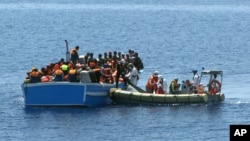Europe appealed to the United Nations Security Council on Monday to back its plans to stem the flow of migrants across the Mediterranean and pledged that those intercepted at sea while making the precarious trip would not be repatriated.
European Union leaders agreed last month to "identify, capture and destroy vessels before they are used by traffickers," but it is unclear how that may be achieved and the 28-nation bloc wants U.N. authorization for its operation.
EU foreign policy chief Federica Mogherini told the Security Council that details of the operation were still being worked out and the issue would be discussed by European foreign ministers on May 18.
She also said the complex crisis of African and Arab migrants seeking to make their way to Europe using smugglers, who often leave them to perish at sea, does not have “one magic solution,” but rather requires a comprehensive response.
“It is not only a humanitarian emergency, but also a security crisis, since smuggling networks are linked to, and in some cases finance, terrorist activities, which contributes to instability in a region that is already unstable enough,” she said.
This year, more than 1,800 people fleeing poverty, conflict and oppression died trying to cross the Mediterranean into Europe. Many have paid their life savings and more to unscrupulous traffickers who send them to sea aboard vessels that are unsafe and overcrowded.
Mogherini was clear that rescued migrants would not be forcibly repatriated.
“Let me explicitly assure you that no refugees or migrants intercepted at sea will be sent back against their will," she said. "Their rights under the Geneva Conventions will be fully honored.”
Most of the migrants are traveling to Europe through Libya, which has descended into chaos nearly four years after the fall of Moammar Gadhafi. Two competing governments backed by militia are scrambling for control of the oil-producing country.
“As long as there will not be a unity government that will exercise its legitimate authority over the entire territory of the country and its land and sea borders, the situation is likely to continue this way,” she said of the North African country.
Mogherini told reporters that the EU Commission will meet Wednesday to adopt its new agenda for migration and it will likely include stepped up search and rescue operations and expanded visas for migrants.
At the U.N. Security Council, Britain and France have been drafting a resolution that diplomats say would seek to authorize action against suspected smugglers’ vessels on the high seas, in Libya’s territorial waters and along its coast. Mogherini said the draft would be circulated to the full council on Monday.
She said it would be similar in principle to council resolutions in place since 2008 authorizing maritime action against pirates operating off of Somalia. Those resolutions allow international counter-piracy action to be carried out within Somali territorial waters and on land in Somalia.
Italian Prime Minister Matteo Renzi, whose country has been the frontline for rescuing and receiving migrants, has proposed destroying smugglers’ boats before they are filled with migrants as a preemptive way to stop the traffickers.
Mogherini said the EU wants to destroy the “business model” of smugglers and the destruction of their boats would prevent their use for the exploitation of more migrants. Of the traffickers, she said, “They sell hope, but instead they deliver death.”
Portions of this report are from Reuters.




